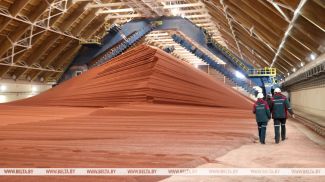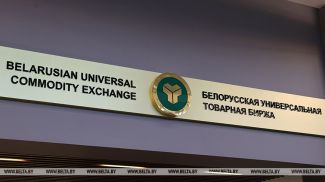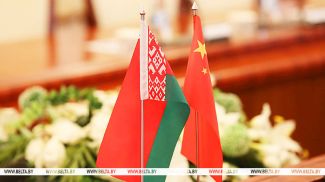MINSK, 6 May (BelTA) – The launch of a new investment cycle is a task of national importance. The task was formulated by the head of state during the 6th Belarusian People's Congress. Over Br200 billion will have to be invested over the course of five years in order to reach the targeted growth parameters. To this effect the Economy Ministry is working with other government agencies to put together a set of measures. The work is expected to secure an increase in investments in the economy up to 23% of the GDP in 2025, Belarusian Economy Minister Aleksandr Chervyakov told BelTA in an interview.
The set of measures is subdivided into three blocks. The first one focuses on increasing the number of sources for creating resources and capital and on expanding the long money segment in the economy. “I should note that it is the key area and the most complicated one in terms of depth and scale of the work. We intend to set up a group of experts. Specialists from finance and banking, investment funds will contribute to their work. We also intend to develop a maximum spectrum of financial tools and make them affordable for the private sector,” he remarked.
According to Aleksandr Chervyakov, it is objectively understood today that focusing on a development model based on loans has no future. “It is necessary to put together a financial and investment development model, including using such tools as bonded loans. It is necessary to enable additional conditions for the development of capital stock, introduction of syndicated loans, re-investment of profits in fixed capital. It is necessary to attract money of the population, the so-called mattress savings. On the whole, we have to create our own national investment market while minimizing various risks. And it is necessary to start with the investment awareness of corporations and individuals,” the official explained the essence of the new policy.
The second block of measures will allow reducing investors' costs in the course of project implementation. “These decisions can be promptly made at the level of the central government and municipal authorities. They primarily focus on architectural and civil engineering regulations. For instance, optimization of expert evaluation procedures, the sequence, the time frame, reconciliation and approval of urban planning documentation and so on. Land ownership relations will be looked into as well. We intend to get rid of excessive technical and administrative norms and procedures in the course of building industrial facilities. We will try to switch the entire lifecycle of construction of a major facility to digital technologies. Experts believe that by optimizing all these processes we can save up to 20-30% of investment costs at all the stages starting with designing, construction, equipment installation, and commissioning of the facility. The construction time can be reduced by at least 1.5 times. It will be possible to commission a project faster and get budget revenues sooner. We intend to get business associations and major civil engineering companies involved in this work,” the economy minister said.
Speaking about the third block of measures (institutional ones), Aleksandr Chervyakov stressed that it is the most complicated one to work out and they will need more time to implement it. “Virtually all the participants of investment activities and certainly members of the parliament are involved in this work. We have to ensure predictability and stability of conditions in the course of implementation of primarily key projects, large-scale investment projects. It is very important for investors to understand conditions of doing business on the horizon of at least five years as the investor develops its business model and financial model. The investor also needs to understand what standard package of preferences the government will offer. We intend to look into a number of matters that will reduce the investor's costs in the form of fiscal deductions on machines and equipment, buildings and structures. In order to support investment projects in the manufacturing sector, we intend to legislate a special legal regime of special investment agreements with the possibility of guaranteed government contracts. We also have many other ideas,” the official noted.
Speaking about the key issue – the existing investment projects, the economy minister noted that although more than 600 investment projects have been suggested, the number is insufficient for launching a new investment cycle. “We have several control levers. The first one is the state budget, the area where the government controls capital investments. Efforts in this area are implemented in the form of a government investment program for 2021, in the form of nationwide and regional programs. We are now polishing the methodology of prioritizing the projects that make up the national infrastructure plan. On the whole, the budget coverage of all the investments will exceed 20%,” Aleksandr Chervyakov noted.
The second lever is an industry-specific one. “As we develop industry-specific five-year plans, we focus only on specific investment projects and rule out measures and events relating to routine operations. We include breakthrough initiatives that substantially change human lives for the better, initiatives that act as growth drivers, have significant social and economic effects, and contribute to interaction between industries. The projects should have specific beneficiaries and understandable and measurable results. Putting together programs based on tangible projects is the idea. The work will proceed at the level of industry-specific ministries and concerns and will involve scientists. It was defended on the Economy Ministry platform with the involvement of the overseeing deputy prime minister,” Aleksandr Chervyakov said. “A government program on innovative development has been prepared. It envisages over 70 projects in healthcare, pharmaceutics, mechanical engineering, chemical industry, power engineering, civil engineering, and agribusiness.”
“Projects of the future” will become a fundamentally new approach to implementing the innovation policy. They provide for a comprehensive approach to the creation and development of new industries starting with ideas and ending with the foundation of manufacturing enterprises with a high economic effect. Five projects of the future have been determined: national electric transport, biotechnologies in agribusiness, innovative healthcare, smart cities of Belarus. It is now necessary to fill them with concrete things. The total volume of investments in projects of the future and innovative projects will exceed Br6 billion.
The fourth control lever is integration. Within the framework of a Eurasian industrialization program Belarus is participating in the implementation of 32 major investment projects and significant projects in the manufacturing sector (machine tool production, chemical industry, production of construction materials, and other branches), the economy minister reminded.
At the end of the interview Aleksandr Chervyakov drew attention to the fifth level – infrastructure. “The development of infrastructure is a key task of the state. The government has done a huge amount of work to systematize infrastructure objects in a common national infrastructure plan. But long-term economic growth requires major strategic initiatives in the form of inter-industry infrastructure multiprojects. They have to become catalysts for the creation of new industries and manufacturing enterprises. They have to bring about demand for new kinds of services,” the official noted and dwelled on two directions. “Health of the nation is the first one. It is a key issue for us. We see the development of the leisure industry and domestic tourism. A window of opportunity has been opened. We can combine our accomplishments in healthcare with traditional Chinese medicine, beautiful nature, clean air of our forests and organic food. We can invite investors to set up regional clusters for recreation and post-COVID rehabilitation for Belarusians and neighboring nations. The demand for these services will only grow larger.”
Results of a recent climate summit confirm the importance of the second direction: low-carbon technologies are growing more and more popular. “This is why the matter of construction of the second nuclear power plant can become quite essential for our economy. Nuclear energy is environmentally friendly. The use of nuclear energy for manufacturing will make our products more competitive on the European market and will open up opportunities for the development of hydrogen energy industry. And certainly the emergence of such an important facility in one of the regions will drive its growth,” the Belarusian economy minister concluded.













